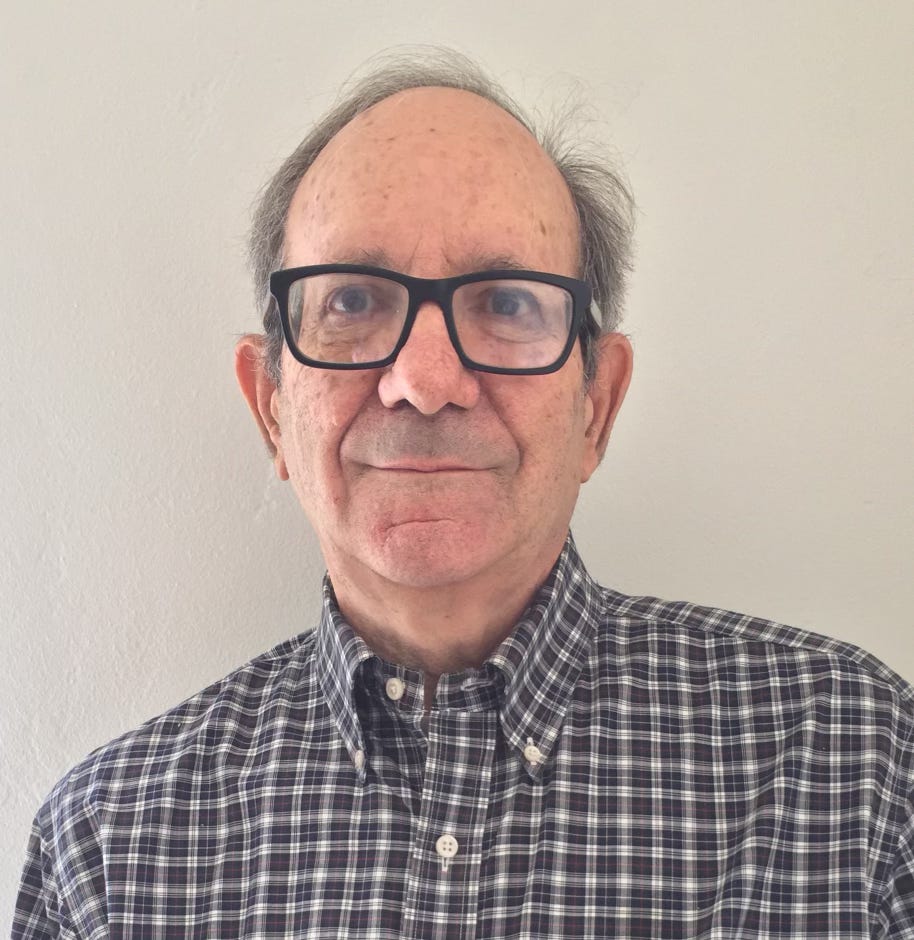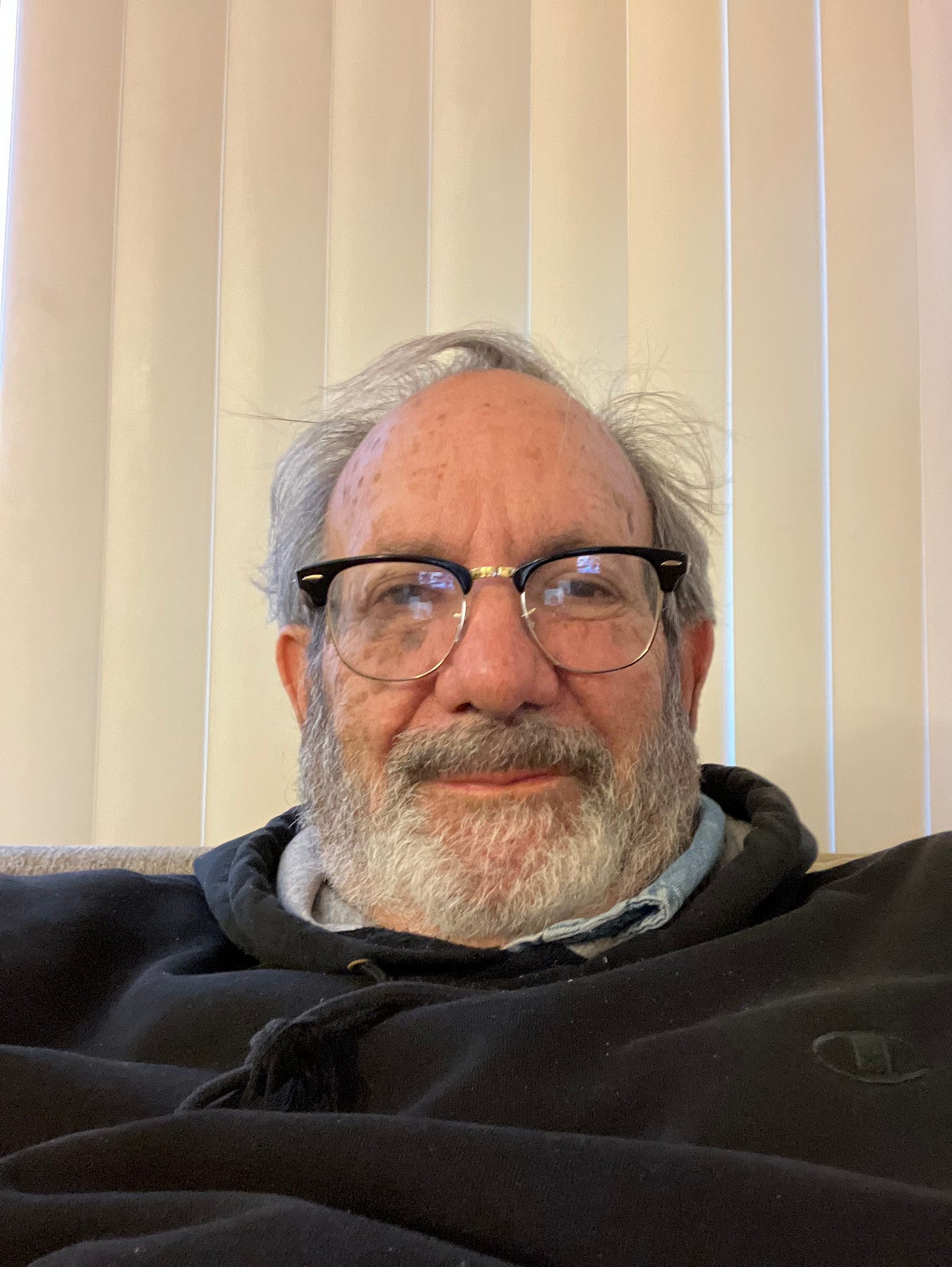Books & Music: Writer, Cultural Critic, and National Book Critics Circle Member Paul Wilner
"I’m heartened by a real proliferation of new and upcoming writers...who are doing excellent, sometimes risky and important work."
Today’s interviewee is a writer and critic who has as much enthusiasm and affection for books, film, and music as anyone I know—whenever Paul shares a recommendation, it’s worth paying attention to. He’s also ardently supportive and encouraging of fellow writers—more than a few times he’s given me pep talks when I was feeling less than optimistic about my writing and the midlist author horse latitudes.
He was an early reader of my second novel, Paris, He Said, and I still remember where I was when the email he sent to me about it arrived—the northern end of Lake Shore Drive in Chicago (Adam was driving, I swear!) He liked it (much more than I’d hoped), and his email did more to attenuate my pre-publication fears and doubts than anything else that came in before its May 2015 pub date.
Paul lives up the California coast from me, but is originally from the East Coast, and I really enjoyed learning more about his earliest days as a writer (and his copy-boy stint at the New York Times)!
Christine/Bookish: You've written for publications such as The Village Voice, San Francisco Chronicle, Los Angeles Herald Examiner, and the Los Angeles Times. Did you begin as a book or cultural critic or were you writing other types of journalism when you started writing for periodicals, e.g. reported local news?
Paul Wilner: I didn’t start out as a book reviewer or cultural critic. I always liked to read and write though, and after I dropped out of UC Berkeley (long story), my mom, who was working as a secretary at the New York Times, helped me get a job there as a copy boy. I started writing for the business section—it was a field I knew almost nothing about, but one of the editors liked to mentor younger journalists and helped me along.
At the time, they had suburban sections that were chronically short-staffed—one of the first pieces I did was for the New Jersey section interviewing William Carlos Williams’ children after their mother, Flossie—Williams’ wife and muse—passed away. And I spoke to other writers, including the poets William Meredith and Louis Simpson, academics (Richard Poirier) and literary journalists (Brendan Gill).
I also had a poem published in The Paris Review while I was there and reviewed Ann Beattie’s debut novel, Chilly Scenes of Winter, and short story collection, Distortions, for The Village Voice.
But there was no clear career path forward in that field, and I ended up working as a general assignment reporter for the Los Angeles Herald Examiner, and freelancing cultural pieces for them on the side.
CS: Along with The Paris Review, you've published poems in ZYZZYVA and a number of other journals. Are you working on a poetry collection? Besides cultural criticism, what do you write most often?
Paul: As mentioned above, my poetry has appeared in The Paris Review and ZYZZYVA—also Kelp Journal, a cool site run by some locals based in the Monterey area, where I have been living for some time, and Journal of the Plague Years, a literary and political start-up which has branched into publishing, with a new anthology of responses to the Covid epidemic.
I have thought about putting together a poetry collection. At this point, I have a fairly decent body of work, but it’s a little daunting. I’m not that well organized, and though I’ve sent it out to a couple of places, haven’t had the heart so far to do a full tilt plan of attack on the various publishers. These things seem more natural when you’re working with friends who get your work, rather than dropping pennies into the well with blind submissions to strangers. Or maybe I’m just afraid of rejection…
These days, I’m mostly publishing interviews with California authors—I write a book column for the Nob Hill Gazette in San Francisco—along with reviews for ZYZZYVA, Alta, and other outlets. I also had a portion of a memoir published in ZYZZYVA a while back, in the same issue as a Rita Bullwinkel story that was later adapted for her (amazing) new novel, Headshot!
ZYZZYVA editor Oscar Villalon and his predecessor, Laura Cogan, have a great eye for talent, and I really respect what they’re doing to nurture and protect the literary process.
CS: You've read more than anyone I know and also know so much about music. Would you talk about your life in books and music a bit, for example, who are the authors and musicians you admire most?
PW: Music is a big part of my life, though I’m the first to admit I have no formal education in the field. My father was a jazz buff who turned me on to Count Basie, Billie Holiday and Duke Ellington (we parted company about rock n’ roll.) The musicians I most admire (forgive the Boomer orientation) are Miles Davis, Bob Dylan (each almost as much for their quirky personalities as their unquestionable genius), Bill Evans, Dexter Gordon. I could go on, but won’t.
I saw the Rolling Stones in their very early days at the Academy of Music in New York, and again, admire their attitude (however diminished over the years) as much as their repertoire.
Merle Haggard was a pretty good poet in song, too. As someone said about country music, “It’s three chords and the truth.’’ There’s no direct correlation between any of these and my literary heroes, but it feels like they’re singing the same song, on different instruments.
CS: You're in the National Book Critics Circle - how did you get involved with this organization and would you share with us what exactly the NBCC is and what its mission is?
PW: The NBCC is a great organization that tries to support reviewers and literary journalists even as the newspaper outlets (book sections and the like) have either been cut back or eliminated. And they have annual awards ceremonies in fiction, nonfiction, poetry, works in translation and the like. I’m not too involved with the inner workings, but they seem less stuffy than the National Book Awards. They also have an annual Nona Balakian Citation for Excellence in Reviewing which tickles me, since Nona (a very kind and generous soul) was a staffer in the Times’ Book Review section when I was a copy kid.
CS: As someone who knows a lot about the publishing industry, are there trends you're keeping an eye on? There's plenty to feel discouraged about with the conglomeration of corporate publishing, but what do you feel optimistic about?
PW: I don’t know what more can be said about the state of publishing—always a parlous industry—than what people already know. I’m unhappy about the downward spiral of editors and agents not wanting to take a risk on mid-list writers doing valuable work because they’re worried about dwindling sales. I get it—like many other businesses, it’s in real trouble—but that doesn’t mean I have to like it. It reminds me of Hollywood—no one likes to greenlight a project because they don’t want to be blamed if it’s not successful.
That said, I’m heartened by a real proliferation of new and upcoming writers—including you, Christine!—who are doing excellent, sometimes risky and important work, either published in the dwindling number of houses willing to take a risk, or in literary journals, that are worthy of being considered in the same tradition as Alice Munro, Mavis Gallant, Raymond Carver or earlier literary models.
I don’t know how they shut out the white noise of social media and endless, pointless chatter—it takes dedication, and concentration. But I’m beyond grateful that they manage to do so—it’s an eloquent response to doomsaying and performative pessimism.
Samples of Paul’s work:
1. Poem, “Albatross,” ZYZZYVA
2. Review of Red Arrow by William Brewer, Alta Journal
3. Essay on Leonard Gardner, San Francisco Chronicle
—
Paul Wilner is an itinerant journalist, poet, and critic based in Monterey County. A longtime member of the National Book Critics Circle, his work has appeared in The Paris Review, New York Times, ZYZZYVA, Alta Journal, San Francisco Chronicle and Monterey County Weekly, among other publications. He writes a book column for the Nob Hill Gazette in San Francisco.







Good to hear a sane voice--and one of experience--about the state of writing. Thanks.
Well done, Christine. Paul has long been a thoughtful man of letters, books, ideas, and clarity. Terrific to gain insights into his work and journey. Thank you.